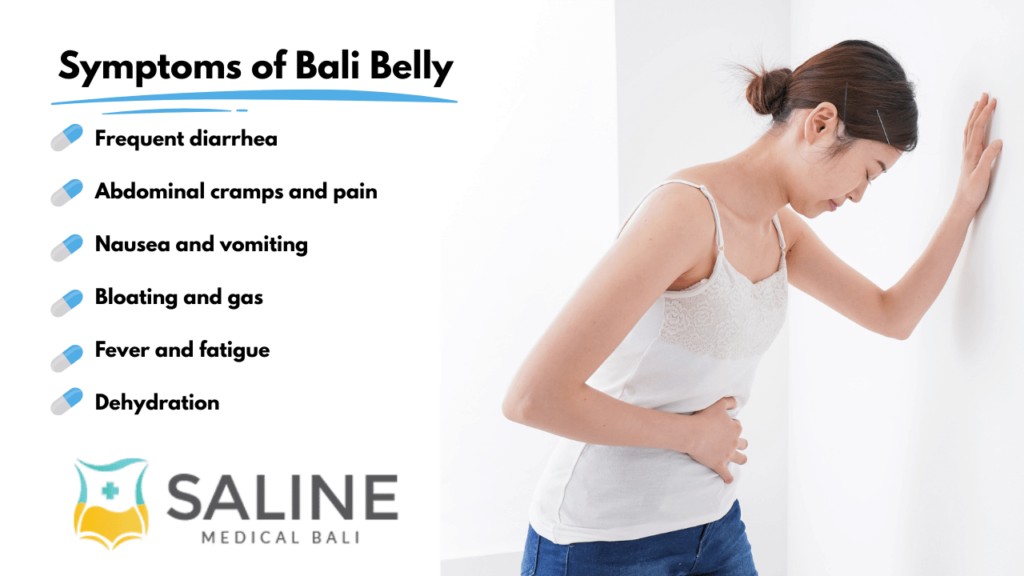
Bali belly IV Drip is a type of treatment performed by doctors, nurses or medical personnel who are experts in their field. This treatment is better known as Intravenous or IV drips, in which, in practice, the medicine and fluid will be inserted through IV cannula into the vein for a faster and more effective effect. Still, it is necessary to remember that this treatment method is carried out when a person is already feeling dehydrated and has difficulty drinking oral medication due to nausea.
Technically, someone who has Bali Belly could get it from bacteria, viruses or parasites that attack the digestive system. The IV Drip method, which directly enters the medicine into the bloodstream, will reach the digestive system faster which will stop and kill the culprits causing Bali Belly.
In practice, Bali Belly IV Drip is recommended for patients suffering from diarrhea or vomiting and dehydration. Bali belly is a type of disease that may require Bali belly IV Drip treatment for its recovery.
Before discussing IV Drip in-depth, do you know about Bali belly? Or have you experienced this disease? In order to provide a thorough understanding, let’s discuss Bali Belly further.

What is Bali belly?
Bali Belly is a term that is often given when someone experiences stomach problems while in Bali. As a tourist destination in great demand both by domestic and foreign tourists, Bali offers several places that can satisfy the tourists who come.
Bali Belly is an illness that could be experienced by tourists in Bali, where sufferers experience digestive disorders caused by contamination of unhealthy food or drinks. A person affected by Bali Belly is usually marked experiencing nausea, headaches, diarrhea, and also fever.
If you are thinking about going for a vacation to Bali, then it is better to pay attention to various factors that can affect you and allow you to get Bali belly IV Drip. Among the many factors that are most often experienced is consuming food or drinks that are not clean so that food bacteria could enter our body and could disturb our digestive system. Apart from that, environmental factors are also essential to pay attention to because if your surroundings are not healthy or unclean, these viruses and bacteria can contaminate your food or drinks anytime. Let us pay attention to these by looking at the several steps you can apply when you are in Bali.
- Beware of consuming ice which is often used to cool your tea or coffee drinks in food places where you can sense that the level of hygiene is quite low. If you want cold water, order bottled packaging, which may be available in many types of variants.
- Try to drink bottled mineral water from bottles and buy it at supermarkets that could guarantee the availability of clean and hygienic water.
- Use Hand Sanitizer to clean your hands before eating or drinking something.
- Try to consume food that is perfectly cooked or if you would like to eat semi-cooked food such as steak or sashimi, make sure to get them at reputable places .
- Avoid using tap water to wash your fruit or cutlery,
- Use bottled water to rinse your mouth or brush your teeth. Avoid rinsing your mouth with tap water, let alone getting it into your mouth when bathing or cleaning it.
You can apply the tips above while in Bali, and you can adjust some of these tips to the place or location wherever you are. However, what if you still get Bali Belly despite having followed all of the above? How will it be handled?
Understanding the Symptoms of Bali Belly

“Bali Belly” is a common term used to describe traveler’s diarrhea or stomach infection that often affects visitors to Bali. It’s typically caused by consuming contaminated food or water, or by a sudden change in diet and local bacteria exposure. While it’s usually not dangerous, the symptoms can be uncomfortable and may interfere with your travel plans.
The most common symptoms of Bali Belly include:
- Frequent diarrhea — watery or loose stools that occur several times a day.
- Abdominal cramps and pain — caused by intestinal inflammation or bacterial infection.
- Nausea and vomiting — often a result of the body trying to flush out harmful bacteria.
- Bloating and gas — due to digestive imbalance and increased intestinal activity.
- Fever and fatigue — indicating the immune system is fighting off infection.
- Dehydration — caused by excessive fluid loss through diarrhea and vomiting.
Symptoms typically appear within a few hours to a couple of days after consuming contaminated food or water. Most cases improve within 5-7 days with rest, hydration, and a light diet. However, if the symptoms persist or worsen, medical attention is recommended.
How to Diagnose Bali Belly

Diagnosing Bali Belly is primarily based on identifying symptoms and understanding recent dietary or travel history. Most cases are mild and do not require extensive medical testing, but proper diagnosis helps ensure the right treatment and prevents complications such as dehydration or prolonged infection.
A healthcare professional will usually begin by asking about your recent meals, water sources, and activities—for instance, whether you consumed street food, ice cubes, or unfiltered water. They’ll also review your symptoms, including the frequency of diarrhea, severity of stomach pain, and presence of fever or vomiting.
In most cases, Bali Belly is diagnosed through clinical evaluation alone. However, if the symptoms are severe or last more than a few days, doctors may request stool tests to identify bacterial, viral, or parasitic infections. These tests can help distinguish Bali Belly from other gastrointestinal conditions such as food poisoning, salmonella, or giardiasis.
Additional tests, such as blood work or electrolyte analysis, may be performed if dehydration is suspected. This ensures the patient receives the right balance of fluids and minerals, especially when IV Drip therapy is needed.
Early and accurate diagnosis not only provides relief faster but also helps travelers avoid unnecessary antibiotics or improper self-treatment, ensuring a safe and quick recovery.
Complications of Bali Belly

While most cases of Bali Belly are mild and resolve within a few days, complications can occur if the condition is left untreated or if dehydration becomes severe. Travelers should be aware of these potential risks to ensure timely medical care and a faster recovery.
The most common complication is dehydration, resulting from excessive loss of fluids and electrolytes due to persistent diarrhea and vomiting. Symptoms of dehydration include dry mouth, dizziness, dark urine, and fatigue. Severe dehydration may require IV fluid therapy to restore hydration and balance essential electrolytes.
In some cases, prolonged infection can occur when harmful bacteria or parasites remain in the digestive system. This may lead to ongoing digestive issues such as bloating, irregular bowel movements, or post-infectious irritable bowel syndrome (IBS).
Another possible complication is electrolyte imbalance, where the body loses essential minerals like sodium, potassium, and magnesium. This can cause muscle weakness, irregular heartbeat, and confusion—especially in children or older adults.
Although rare, secondary infections or inflammation of the intestines (gastroenteritis) can develop, leading to more serious conditions that require medical treatment.
Fortunately, most complications can be prevented through early intervention, proper hydration, and treatments like Bali Belly IV Drip, which helps restore fluids, reduce nausea, and support faster recovery from symptoms.

How can Bali Belly IV drip help avoid Bali Belly?
As previously explained, treatment with an IV Drip could be used when you have Bali Belly.If you really can’t stand the cramp, nausea or if the frequency of your diarrhea is high, the doctor will recommend an IV drip for this Bali Belly IV Drip patient.
Drug administration with the IV Drip method is the same as other medicinal drugs. The process can generally be divided into two types in this Bali belly IV Drip Infusion. Firstly, you will be given liquid that will be flown through the IV cannula. The next step is that you will be given medicines that will be inserted in the saline bag and you will get it directly from the cannula that is already inserted.
From its working system, the Bali Belly IV drip is indeed faster to help recovery, because when the medicine is directed directly to the blood vessels, the medications could work directly at the targeted bacteria. It will work faster and be absorbed optimally compared to the usual oral medication that needs to be digested first and the absorption rate is less than 100%, working slower and less efficiently.
Even though this treatment is somewhat more effective, keep in mind that after it is done, you must rest for at least one day to ensure full recovery. Apart from that, you will be given oral medication to complete the treatment, and you need to drink it according to the doctor’s prescription. When we suffer from Bali Belly, our digestion system is affected and thus we need to eat food that is soft to digest, and not containing a lot of fibre. These are the types of food to have during the recovery process.
Bali Belly is an illness that is often suffered by tourists. So if you want to enjoy your holiday and to make sure it is stress-free, start taking care of yourself, maintain your cleanliness level and prepare certain supplements or medicines to keep your body fit during this time.
Bali Belly IV Drip Treatment at Saline Bali Clinic – Trusted Care in Canggu

When travelers experience Bali Belly, finding quick and reliable treatment is essential. Saline Bali Clinic stands out as one of Bali’s most trusted medical providers offering Bali Belly IV Drip therapy—a fast, effective solution to help you recover and rehydrate after stomach illness.
Why Choose Saline Bali Clinic?
Saline Bali Clinic provides professional medical care led by certified doctors and licensed nurses under Indonesia’s Ministry of Health. The clinic operates 7 days a week from 8 AM to 10 PM, offering both in-clinic and home visit IV Drip services across Canggu, Seminyak, and surrounding areas. Their Bali Belly IV Drip treatments are designed to restore fluids, electrolytes, and nutrients lost during illness—helping patients regain their energy and feel better within hours.
Saline Bali also offers:
- Rapid response home service, perfect for travelers who are too weak to visit the clinic.
- Digital treatment reports suitable for travel insurance claims.
- Safe, sterile IV solutions and medications approved by Indonesian health authorities.
- Customized IV Drip packages based on the severity of symptoms.
Bali Belly Care Packages

Saline Bali Clinic provides several Bali Belly IV Drip options tailored to each traveler’s condition:
- BALI BELLY Package (IDR 2,300K)
Designed for common traveler’s diarrhea and mild stomach infections. Includes 1000 ml hydration, IV stomach protector, IV anti-nausea, IV anti-diarrhea, Vitamin B Complex, oral medication, and an insurance report. - FOOD INTOLERANCE Package (IDR 2,000K)
Ideal for mild digestive discomfort or light food poisoning without severe diarrhea. Includes 1000 ml hydration, IV stomach protector, IV anti-nausea, Vitamin B Complex, oral medication, and report. - SEVERE BALI BELLY Package (IDR 3,000K)
A complete Bali Belly IV Drip solution for strong symptoms such as high fever, dehydration, or prolonged diarrhea. Includes ~1100 ml hydration, IV anti-nausea, anti-diarrhea, anti-fever, Multivitamin+, oral medication, and report. - BALI BELLY MOMCARE (IDR 2,000K)
Specially formulated for pregnant or breastfeeding women, using safe IV ingredients to relieve nausea, replenish fluids, and restore energy safely.
What to Expect from Bali Belly IV Drip Treatment
The Bali Belly IV Drip at Saline Bali Clinic works by directly infusing fluids, vitamins, and medication into your bloodstream, allowing for faster absorption and immediate relief. This treatment helps:
- Rehydrate the body after excessive fluid loss.
- Reduce nausea and vomiting.
- Balance electrolytes for improved recovery.
- Restore energy levels and minimize fatigue.
Patients can choose to receive treatment at the clinic or book a villa/home service, where a licensed nurse brings all necessary equipment to your location in Canggu or nearby areas. After treatment, you’ll receive a detailed medical report, which can be used for insurance reimbursement.
Trusted and Convenient Care in Canggu
Whether you’re staying in Canggu, Seminyak, or nearby areas, Saline Bali Clinic ensures that professional care is always within reach. Their Bali Belly IV Drip therapy is fast, safe, and specifically designed to help travelers recover comfortably and return to enjoying their time in Bali.If you’re suffering from dehydration, nausea, or stomach pain while traveling, don’t wait—contact Saline Bali Clinic for the best Bali Belly IV Drip treatment and experience world-class care delivered right to your villa in Canggu or hotel in Bali.
Frequently Asked Questions
What is a Bali Belly IV Drip?
A Bali Belly IV Drip is a hydration and recovery treatment designed to relieve symptoms of Bali Belly — such as dehydration, nausea, vomiting, and fatigue. It delivers essential fluids, electrolytes, vitamins, and anti-nausea medication directly into your bloodstream for faster absorption and recovery.
How does the IV drip help with Bali Belly?
The IV drip quickly rehydrates your body, restores lost electrolytes, and replenishes essential nutrients that are often depleted during severe stomach upset. This helps reduce nausea, boosts energy, and speeds up the healing process compared to oral fluids or medication alone.
How long does the treatment take and when will I feel better?
A Bali Belly IV Drip session typically takes 30–45 minutes. Most patients begin to feel noticeably better within an hour after treatment, as hydration and medication take effect almost immediately.
Is the IV drip safe and who administers it?
Yes, the IV drip is safe and administered by licensed medical professionals or registered nurses. All IV solutions and equipment are sterile and medical-grade, ensuring your safety and comfort throughout the procedure.
Can I get a Bali Belly IV Drip at my villa or hotel?
Absolutely. Many clinics, such as Saline Bali Homecare, offer on-demand IV services where medical staff come directly to your accommodation. This allows you to rest comfortably while receiving professional care without having to travel.



